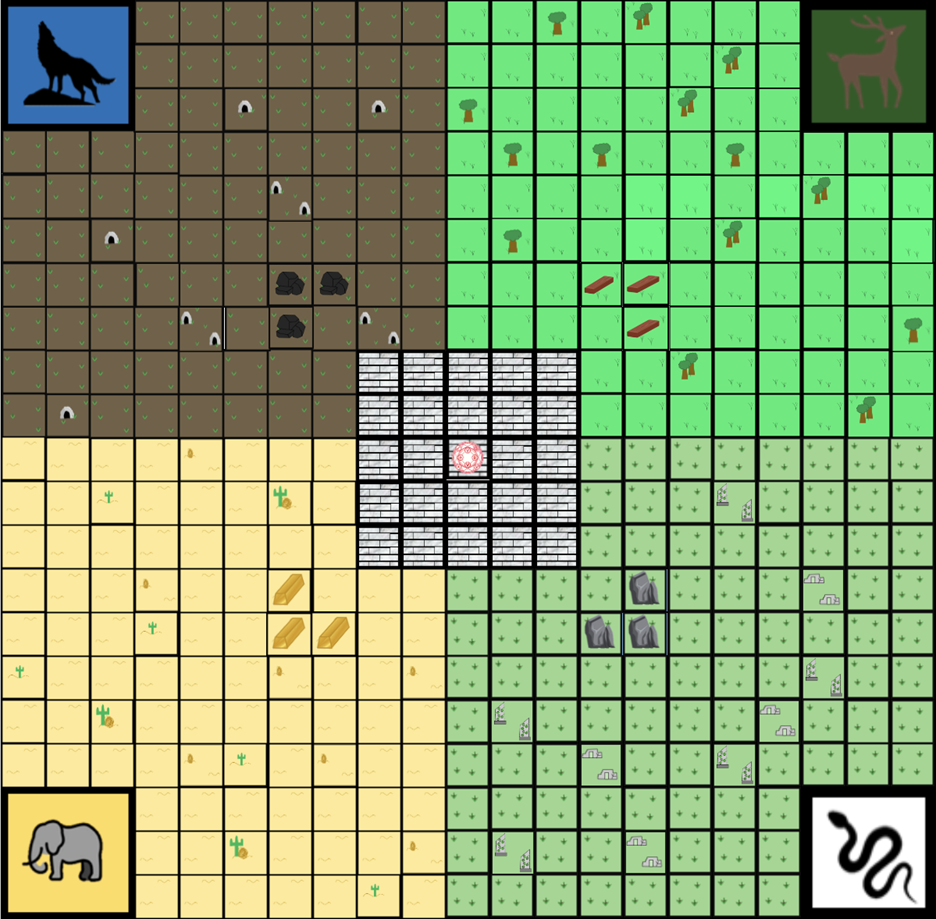Role: Project Lead Date Completed: 2019-2020

This project was for a high school STEM competition organized by the Technology Student Association, and this submission was for the event "Board Game Design".
The objective of the event was for each team to develop a board game with fun and engaging gameplay of any
type and to document its purpose, rules, and progress taken throughout the project.
The team's creation was a 4-player strategy free-for-all board game, revolving around taking turns to harvest resources and build an army to
defeat other player's main piece - the spirit animal.
Link to the Documentation
This project was my first actual experience in being a project lead position and it required me to cover all the development bases.
I had to schedule out meetings and designate goals, establish both long-term and short-term goals, communicate closely with my fellow teammates about their scheduling, skills
and ideas, and constantly collaborated with teammates to provide feedback on the rules, art, and theme of the game. Overall, it was an experience that
opened up my eyes to what it is like being a project leader.
The biggest challenges that I faced as a project lead was having to adjust to various schedules of everyone and
having the serve as the bridge between teammates to interact all together as the group was split into two and
people felt more inclined to talk within their own group which hindered team collaboration.
As for the former, a memorable experience that I had related to this was when a fellow team member and I had to participate in a different school competition,
causing us to miss an important team meeting as a result. This meeting had to be held that day as that was when most of team was available.
Despite this, I decided it would be best to still proceed with the meeting to avoid delaying our timeline. To adjust to this, I had assigned my teammates slightly different
tasks that I believed that they could accomplish without us. Furthermore, I adjusted the timeline to compensate for scheduling issues such as this one.
As for the latter, initially it was common where brainstorming and discussion was split into two groups rather than cycling through the whole team
as people felt more comfortable talking to their friends which in turn resulted in limited discussion. To address this, I would
go about asking individuals about their input on the project and then bounced it through the whole team to get their suggestions. Eventually, the team
became more cooperative the further we went into the project.
In the end, we achieved first in the state for our board game and were looking forward to improve on it for the national competition. Unfortunately, it was cut short
due to the Covid-19 pandemic which led to a stop on the board game's development.
If there was something that I could approve on regarding the development of the project, it would have to be the rules of the game
and testing early on to analyze how enjoyable the gameplay is. Although I thought the rules were well thought out, playing the game revealed flaws with the game.
Gameplay felt too slow and even stagnant which led to an unengaging experience, and there were pieces that were
definitely stronger than the others that created imbalances within the pieces. Something that I would have done to prevent this problem would be to have at least test the game on paper
and surveying others to provide feedback on the rules of the game.
The most significant takeway from this project is how important it is to have close conversations with each team member to gather their thoughts and ideas. This connection facilitates a sense of
individual ownership and empowers them to feel like they too are
leaders. As a result, it led to each person to not only take pride in both their individual and team's contributions, but also motivated each person to give their best effort, knowing that their
impact is just equally important as anyone else's in the team.